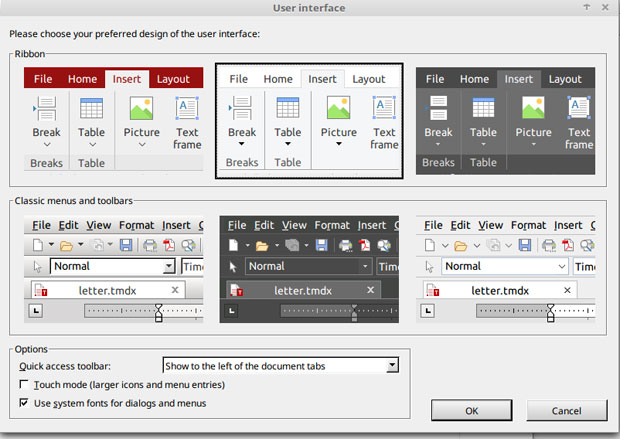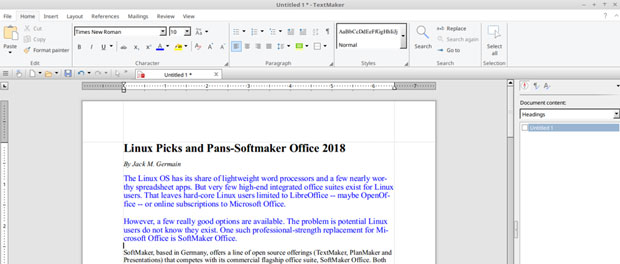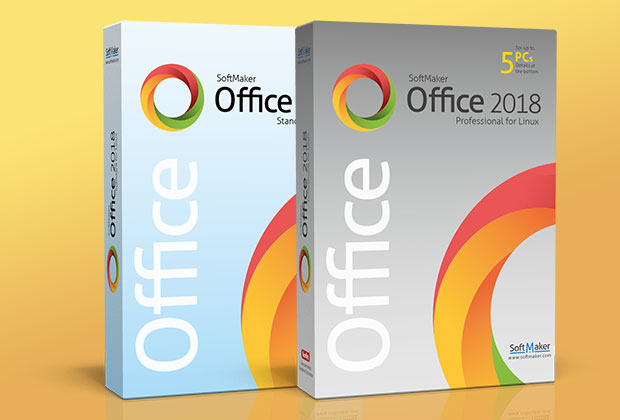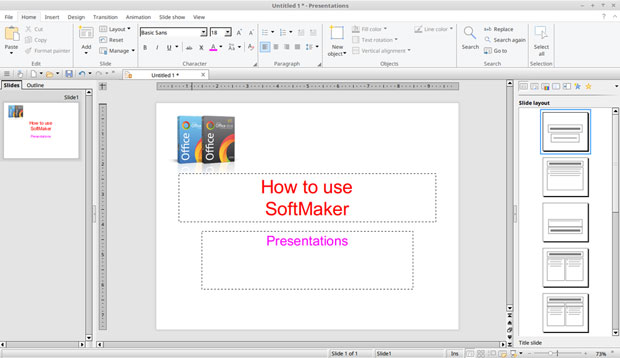![]()
SoftMaker Office could be a first-class professional-strength replacement for Microsoft Office on the Linux desktop.
The Linux OS has its share of lightweight word processors and a few nearly worthy standalone spreadsheet apps, but very few high-end integrated office suites exist for Linux users. Generally, Linux office suites lack a really solid slide presentation creation tool.
Most Linux users opt for LibreOffice — or maybe the withering OpenOffice — or online subscriptions to Microsoft Office through Web browser apps.
However, high-performing options for Linux office suites exist. The SoftMaker office suite product line is one such contender to replace Microsoft Office.
The latest beta release of SoftMaker Office 2018 is fully compatible with Microsoft Office. It offers a completely redesigned user interface that allows users to work with either classic or ribbon menus.

SoftMaker offers a complete line of free and paid office suite products that run on Android devices, Linux distros, and Windows or macOS PCs.
Rethinking Options
The beta version of this commercial Linux office suite is free. When the final version is released, two Linux commercial versions will be available. The licenses for both let you run SoftMaker Office on five computers. It will be priced at US$69.95, or $99.95 if you want a few dictionary add-on tools included.
Check out the free beta of the commercial version. A completely free open source-licensed version called “SoftMaker FreeOffice 2018,” will be available soon. Switching is seamless. The FreeOffice line is distributed under the Mozilla Public License.
The FreeOffice 2018 release will have the same ribbon interface option as SoftMaker Office 2018. The exact feature list is not finalized yet, according to Sales Manager Jordan Popov. Both the free and the paid versions will contain fully functional TextMaker, PlanMaker, and Presentations, just like the paid Linux SoftMaker Office 2018 release. The Linux edition has the Thunderbird email management client.
When I reviewed SoftMaker FreeOffice 2016 and SoftMaker Office 2016, I found the paid and free versions to be almost identical in functionality and features. So opting for the free versus paid versions of the 2018 office suites might be a no-brainer.
The value here is that the free open source and both commercial versions of the 2018 releases are true 64-bit products. Previous releases required some 32-bit dependencies to run on 64-bit architecture.
First Look Impressive
The free version (FreeOffice 2018 for Linux) is not yet available for review. SoftMaker expects to release FreeOffice 2018 for Linux it at the end of the first quarter of 2018.
So I took the free beta release of Office 2018 for a spin to check out the performance of the ribbon user interface. Its performance was impressive.
I regularly use the latest version of LibreOffice and earlier versions of FreeOffice. Their user interfaces mimic standard drop-down menus.
It took me some time to gegt used to the ribbon menu, since I was unfamiliar with using it on Microsoft Office, but I came to like it.
How It Works
The process is a bit different than scrolling down drop-down menus. You click on a category in the toolbar row at the top of the application window and then scan across the lateral display of boxed lists of functions.
The lateral array of clickable menu choices changes with each toolbar category selected. Once I learned what was where, my appreciation for the “ribbon effect” grew.

The labels are: File, Home, Insert, Layout, References, Mailings, Review and View. Click the action you want and instantly see it applied. There are no cascading menus.
At first, I did not like not having any customizations available for things like often-used actions. Then I right-clicked on an item in the ribbon and discovered a pop-up menu.
This provides a way to customize a Quick Action Bar, customize the ribbon display choices, and show the Quick Action toolbar as a separate toolbar. That prompted me to sit up straight and dig in with eyes wide open.
Great User Experience
I process a significant number of graphics-heavy documents each week that are produced with Microsoft Office. I edit many of these documents and create many more.
Much of my work goes to users of Microsoft Office. LibreOffice and SoftMaker Office applications have little to no trouble handling native Microsoft file formats such as DOCX, XLSX and PPTX.
LibreOffice formatting — both on screen and printed versions — are well-done most times. SoftMaker’s document renderings are even more exact.
The beta release of SoftMaker Office 2018 for Linux is even better. Especially with SoftMaker Office 2018, I can exchange files directly with Microsoft Office users without conversion. This obviates the need to import or export documents.
Given the nearly indistinguishable performance between previous paid and free versions of SoftMaker products, it seems safe to expect the same type of performance from FreeOffice 2018 when it arrives.
Expanding Office Reach
SoftOffice products can give you a complete cross-platform continuity for your office suite needs.
Four Android editions are available:
- SoftMaker Office Mobile is the paid or commercial version for Android phones. You can find it in Google Play as TextMaker Mobile, PlanMaker Mobile and Presentations Mobile.
- SoftMaker FreeOffice Mobile is the free version for Android phones. You can find it in Google Play as the FREE OFFICE version of TextMaker Mobile, PlanMaker Mobile, Presentations Mobile.
- SoftMaker Office HD is the paid or commercial version for Android tablets. You can find it in Google Play as TextMaker HD, PlanMaker HD and Presentations HD.
- SoftMaker Office HD Basic is the free version for Android tablets. You can find it in Google Play as TextMaker HD Basic, PlanMaker HD Basic and Presentations HD Basic.
Also available are TextMaker HD Trial, PlanMaker HD Trial and Presentations HD Trial in Google Play. These apps work only for 30 days but have all the features of the full version (Office HD).
Bottom Line
The easy access to the free download of SoftMaker Office 2018 gives you nothing to lose in checking out its suitability as a Microsoft Office replacement. If you decide to upgrade to the paid Linux release, you will pay $69.95 for a proprietary license. That is the same price as the Home and Student editions of Microsoft Office 365.
If you opt for the free open source version, FreeOffice 2018, when it is released, you still could have a top-of-the-line alternative to other Linux tools that play well with Microsoft Office.
Download the SoftMaker Office 2018 beta.
Want to Suggest a Review?
Is there a Linux software application or distro you’d like to suggest for review? Something you love or would like to get to know? Please email your ideas to me, and I’ll consider them for a future Linux Picks and Pans column. And use the Reader Comments feature below to provide your input!
























































Am using Textmaker on Android and all my Linux systems. Paid for the full version. In the past, the free version hasn’t included a dictionary (among other extras).
Used to use LibreOffice but after years of having bugs and very basic usability requests ignored on the basis of a dubious (at best) notion of what constitutes their core user (I think they call him "Bob"?) I wrote off LO. LO has been a mess in terms of style-based writing. Just awful. For example, it’s not possible to search for styles and it’s not possible to search & replace direct formatting with styles (the whole search feature in LO is an embarrassing mess anyway…). This makes writing ebooks a PITA. But LO devs don’t consider ebook authoring a valid usage scenario for "Bob" (they literally told me this), so they do little to nothing to solve these problems. Until 6.0, one needed to install a flaky (which they subsequently broke) ebook conversion extension. It’s my understanding that in 6.0, the ability to convert to epub format will be built in, but will also be beta-ish. I mean, c’mon. Every other word processor has had this ability for years now.
Complain about it and they’ll tell you to code the bug fix or improvement yourself.
Textmaker, on the other hand, has been and remains about a decade ahead of LO as regards style-based writing. If you want to author ebooks, save yourself the hassle of using LO and switch to Textmaker.
One feature that *is* lacking in Textmaker, however, is an equation editor (in the Linux version). The Softmaker devs claim it’s on their to-do list, but they’ve been saying that for several years now.
Lastly, Textmaker’s interoperability with MS Word is much superior to LO’s.
Correct me if I’m wrong, but I’m pretty sure linux version of SoftOffice 2016 supports MDI and FreeOffice 2016 does not. From a daily user standpoint, that is a fairly significant difference. It will be interesting to see if the 2018 versions follow the same pattern.
As a Linux user I do not see me using this suite because it seems it will not be FOSS. On Windows, sure, I will give it a try as recently Microsoft products started to have a poor performance and the testing before release is almost non-existent.
If I learned one thing when switching from Windows to Linux is that FOSS is the way to go and closed source software should be used when there is no other alternative.
Not. I just installed on Ubuntu and it doesn’t work. I tried the android version it didn’t work either. This is a waste of time.
While I use LibreOffice myself, I have noticed from the comments that people that work with a lot of MS documents prefer SoftMaker/FreeOffice over LibreOffice. Those that don’t work with a lot of MS documents prefer LibreOffice.